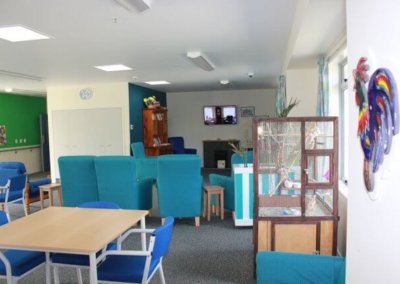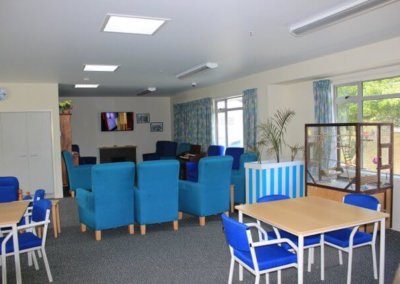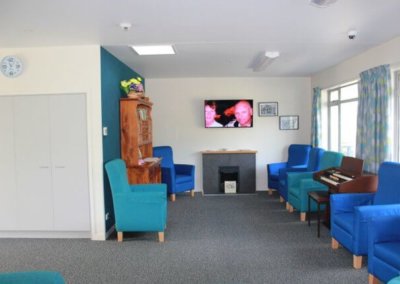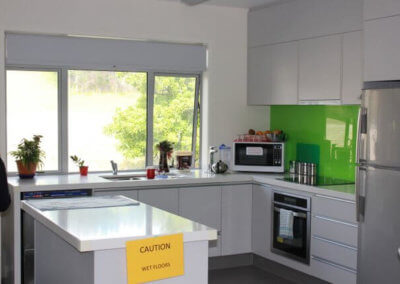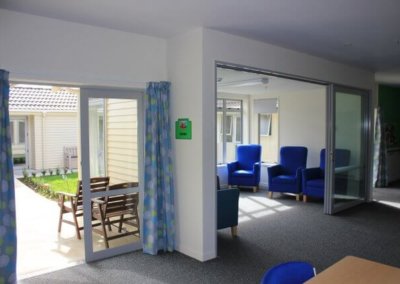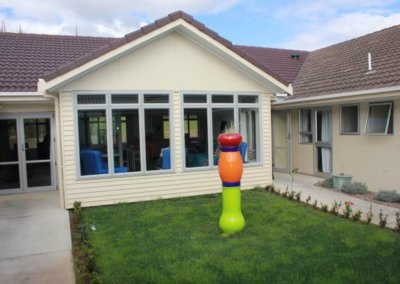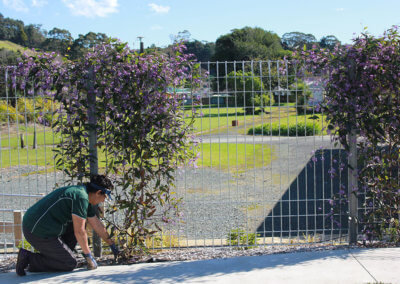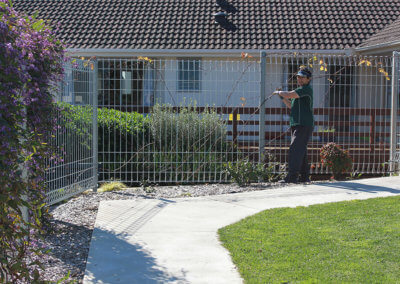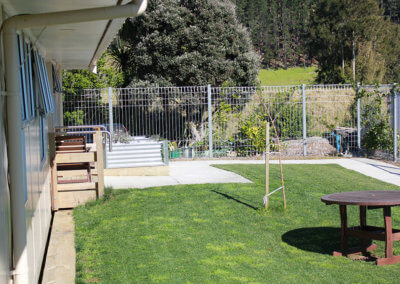Services Guide
Claud Switzer Rest Home, Hospital and Secure Dementia Unit
We provide residential care for 93 residents across our Rest Home, Hospital, and Secure Dementia Unit. In addition to our on-site services, we offer community-based day programmes; with transport from Mangonui, Ahipara, and Kaitaia.
Our home is divided into five households – Kauri, Matai, Puriri, Kowhai, and Millie, each supported by a dedicated team of care partners. This household model fosters meaningful, consistent relationships between residents and staff, creating a warm, familiar environment that feels like home.
At the heart of our philosophy is the creation of a human habitat – a place where individuals are respected, valued, and encouraged to engage in activities they enjoy, such as cooking, gardening, and socialising. We embrace spontaneity and warmly welcome visitors, including children and animals, who bring joy and connection to our community.
We are also actively developing our gardens and plant collections, and we welcome the support of volunteers and community members who share our passion for creating a vibrant, nurturing environment.
Residential Care Agreement and Fee Structure
Getting started
Application to move into care begins with a Needs Assessment. This will inform you what level of care is recommended and whether you meet financial eligibility criteria to qualify for the Residential Care Subsidy. This assessment is carried out by an independent assessor normally arranged by your GP while you live in the community or you can call our Needs Assessment Service Coordinators on 09 408 9180
Paying for your care
You will be means-tested by the Needs Assessor to see how much you are able to pay toward the cost of care. The publically-funded Residential Care Subsidy is available to those eligible, to make up shortfalls.
To be eligible for Government funding, your entry to permanent residential care must be through our Northland District Health Board (NDHB). It is possible to enter residential care without involving NDHB, but you will be liable for the total cost of your care.
Fees for all levels of care are capped at maximum contribution rates for both subsidised and privately paying residents, excluding any Premium Room Fees you may agree to pay. Payment of maximum contribution covers Contracted Care Services which are detailed in the contract between Claud Switzer Memorial Trust Board and NDHB.
It is worth noting that care homes are not permitted to provide any information or advice to you regarding your eligibility or subsidies available to you. As these subjects are outside care homes’ jurisdiction, you should direct any enquiries to your Needs Assessor and Work and Income.
Private Paying Residents
Those who do not meet the asset threshold for Residential Care Subsidy will be required to pay their own fees which are limited to the maximum contribution for contracted care services. This applies to all levels of residential care.
If you do not financially qualify for a Residential Care Subsidy because you own a property and other assets, you may apply for a Residential Care Loan to assist with the cost of your care.
Claud Switzer Memorial Trust is not able to extend credit.
Premium Room Fees
Premium Room Fees apply in Switzer rooms which are staffed and resourced for Hospital Level Care. This level of care attracts a significantly higher rate than Rest Home Care rates.
Standard publically-funded residential care rooms are by definition approximately 10m2 in areas with shared bathroom facilities. Additional features of a permanent or fixed nature such as ensuites, larger room areas and access to decks and gardens, for example, will attract Premium Room Fees to reflect the increased costs in providing them and that the Care Home must fund ALL capital improvements.
There is no Government funding available for premium room fees or additional services. Even if you are receiving the Residential Care Subsidy, you may still be required to pay Premium Room Fees for such additions if you choose them.
Switzer Premium Room Fees are between $10 and $30 per day (GST inclusive). Our Nurse Managers or Finance Administrator can confirm any potential additional fees on available rooms.
Residential Care Subsidy
Independent information on the Residential Care Subsidy, including eligibility and how to apply is available on the Seniorline website:
https://seniorline.org.nz/rest-homes-hospitals/cost-of-care/residential-care-subsidy-loan/
Suggested Application Process
Ask your GP for a Needs Assessment referral. A Needs Assessment by NASC using the interrail software confirms your needs for your future care.
The assessment will ascertain the most suitable level of residential care required by you. In Switzer Home’s case, Dementia (Memory Loss), Rest Home or Hospital Care.
You can discuss options and plans with the Needs Assessor and your family or support person.
In researching residential care options available, you are welcome to contact our Resident Wellness Co-ordinator to visit Switzer Home with family or a support person to see what we offer or ask any questions you have – completely without obligation.
Establish your preferred residential care option including whether or not there are any Premium Room features applicable.
If Switzer Home is your choice, our Resident Wellness Co-ordinator or Clinical Nurse Lead will provide you with a copy of the Admission Agreement for you to read, as well as answering any queries you have about Switzer.
Fill in and sign the Admission Agreement.
Apply for a Residential Care Subsidy or Loan if appropriate or pay privately. Switzer Home fees are charged one month in advance for the initial payment and fortnightly thereafter.
For further information about our services please contact us for a brochure or for our Residential Care Agreement and Fee Structure, you may also wish to read our Welcome to Switzer.
We welcome all visitors and enquiries.
If you would like to view our facilities and talk to our staff, please
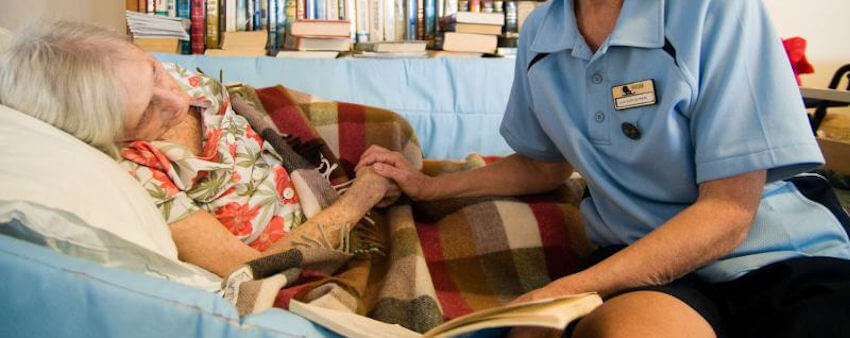
Kowhai Household – Hospital level single bedrooms, with one double room, some bedrooms have ensuite facilities.
Kauri Household – All single rest-home rooms with vanity units and shared bathroom facilities.
Matai Household – Dual purpose single bedrooms, one double room, majority of single rooms have an ensuite.
Millie Household – Dual purpose large single bedrooms, majority have large ensuite.
Puriri Secure Dementia Unit
The Puriri Secure Care Unit is a protected living environment which provides rest home level care to older people who are adversely affected by dementia and related disorders.
The unit provides a safe, secure and homely environment. The unit has 15 individual bedrooms, all with a toilet and vanity unit. There are also shared shower and communal toilet facilities. We have 2 garden areas, a courtyard, and a larger area with pleasant views of the hills and surrounding farmland. Residents and their families/whanau can sit outdoors and enjoy time together. The rear garden has raised beds for those residents who enjoy looking after plants. The unit has been designed to provide a great indoor – outdoor flow so that residents can wander at their will within a secure environment.
Families are encouraged to visit and are free to take their relative out of the unit for a walk or an outing. You are welcome to make a cup of tea or coffee at anytime.
A Diversional Therapist is part of the team so group or one-on-one activity sessions are held in Puriri Wing every day. Residents are also invited to attend activities in other areas of the facility with staff from the unit caring for them. We arrange outings for the residents and families are welcome to join these outings and to assist their relative or others (seating permitting).
Staff working in the unit have been chosen because they want to work with people with dementia, they have the specialist education, knowledge, skills and the personality and the manner required. There is daily and ongoing Registered Nurse oversight, with a Registered Nurse on-site and available at all times, day or night.
Community Programs
Our Day Care Services are community based and held off-site in Mangonui, Ahipara and in Kaitaia. We have opted not to have them 9001:2015 Certified. However, we apply the same quality management standards to them as we do to the residential care services.
The Golden Age Club
Provides social days out for older people. Club membership is free of charge for those older people who will benefit. Click below for our Golden Age brochure.
The Alz Club
Is a day care service for people with dementia. Click here for our Alz Club brochure.
Respite Care
Respite Care is the provision of regular planned periods of relief for carer(s).
Carer Support
If you are caring for someone with a disability you may be eligible for a Carer Support subsidy.
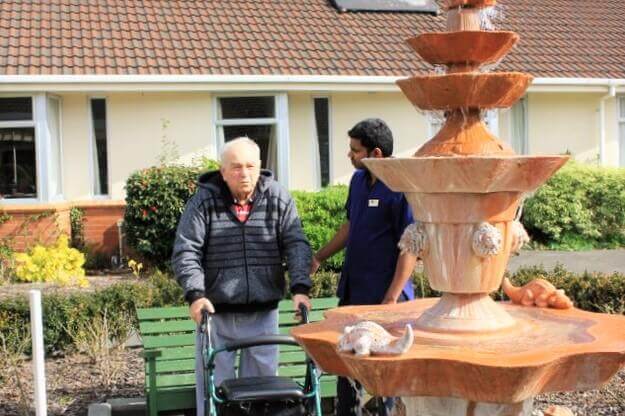
Your Rights and Responsibilities
The Code of Health & Disability Services Consumers’ Rights applies to all health services and disability support services in New Zealand.
As a client of the Claud Switzer Memorial Trust, your rights will be respected.
ONE - MANA - RESPECT & PRIVACY
- You should be treated with respect, including respect for your personal privacy
- Services should take into account your cultural, religious, social and ethnic needs, values and beliefs
TWO - MANAAKITANGA - FAIR TREATMENT
- You should be free from discrimination on the grounds of age, gender, race, beliefs, marital or family status, employment, sexual orientation or disability
- Services should be delivered without coercion, harassment or any form of exploitation
THREE - TU RANGATIRA MOTUHAKE - DIGNITY & INDEPENDENCE
FOUR - TAUTIKANGA - PROPER STANDARDS
- Be provided with reasonable care and skill
- Meet legal, ethical, professional and other relevant standards
- Be consistent with your needs
- Minimise potential harm
- Providers should cooperate with each other to ensure you have quality care
FIVE - WHAKAWHITIWHITI NGA WHAKAARO - EFFECTIVE COMMUNICATION
- Information should be given in a form, language and manner which you can understand you should be listened to
- A competent interpreter should be available if you need one and if it is reasonably practicable
- Communication should take place in an environment that supports open, honest and effective discussion
SIX - WHAKAMOHIA - INFORMATION
- an explanation of your condition
- your options, including the expected risks, side effects, benefits and costs
- an estimate of when you will receive a service
- advice of any possible involvement in teaching or research
- the results of tests or procedures
- the information you need to make a decision
You should be given honest answers to your questions relating to services. This includes questions about:
- the identity or qualifications of a provider
- your provider’s recommendations
- how to get another opinion
- results of research which you were involved in
* You have a right to request and receive a written summary of information
SEVEN - WHAKARITENGA MOU AKE - YOUR CHOICES & DECISIONS
- You should receive a service only when you have made an informed choice and given your informed consent
- You should be presumed to be competent to make choices and give consent unless there are reasonable grounds for a provider to conclude otherwise
- If you have diminished competence (for example, a child) you should be allowed to make choices and give consent to the level of your ability
- In circumstances where services have to be delivered without your consent, they should be in your best interests. Steps should be taken to discover whether services would be consistent with your wishes, including discussing the matter with available family and close friends
- You may make a decision in advance, in accordance with common law
- Your consent should be obtained in writing when you will be involved in research, an experimental procedure, a general anaesthetic or where there are possible significant adverse effects
- You may refuse services and withdraw your consent
- You may change to another provider where it is practicable to do so
- You may make decisions about body parts or bodily substances
EIGHT - TAUTOKO - SUPPORT
- You may have a support person or persons of your choice with you, as long as it is safe and other consumers’ rights are not unreasonably affected
NINE - AKO ME TE RANGAHAU - RIGHTS DURING TEACHING OR RESEARCH
- All of these rights apply when you are being asked about or taking part in teaching or research
TEN - AMAUAMU - COMPLAINTS
- You may make a complaint in any form appropriate to you
- You should be advised of your provider’s complaints and appeals procedure
- You should be kept informed about the progress and outcome of your complaint
- You should be advised of the availability of Advocates and the Nationwide Health and Disability Advocacy Service to assist with your complaint
- You should not be adversely affected by complaining
If you have difficulties with a health and disability service and they do not appear to be covered by these rights, they may be covered by the Privacy Act or the Human Rights Act.
Your Responsibilities
As a resident you also have responsibilities. These include;
1. Respect for others
Residents must respect the rights of other residents, staff and visitors. This includes adhering to any rules of the facility and behaving in a way which is sensible and doesn’t offend others. For example, noise should be kept to a reasonable level.
2. Respect for the facility
All residents must respect the facility and the property of other residents. This includes trying not to damage the surroundings, and not taking anything which belongs to someone else.
3. Keep others informed
Residents have a responsibility to keep others informed. This includes:
a) telling someone when they are leaving the facility, and when they return
b) telling the staff when they are unwell
c) working with staff to improve or maintain their health and wellbeing.
4. Health Information
Information will be collected from you prior to and when you commence any Switzer service to help us identify your needs. It is important that the information supplied is accurate and up to date.
The information you provide to us will be held securely. You may request access to the information in your file by writing to the Manager.

Advocacy
Our Advocacy service is…
Independent
Advocates are employed by services independent of the health and disability service providers and funders
and from government agencies.
Confidential
Advocates will keep your information confidential.
Free
The service is funded under the Health and Disability
Commissioner Act 1994.
On the side of the consumer
An advocate will support consumers who believe that their rights under the Code of Rights have been breached.
What to do if you have a problem or complaint
If you are unhappy about the service you received from a health or disability service provider you can:
Take your concerns directly to the person or organisation that provided the service. A copy of our complaints procedure has been included in your admission agreement. Forms are also readily available at Switzer to record your Compliments, Concerns or Complaints.
Get help and support from friends or family/whanau to raise your concerns with the provider.
Seek the support of an advocate to help you.
What is an Advocate?
Independent advocates help and support people to know their Rights and the actions they can take if they have a concern about a health or disability service.
Ko enei ngā tangatā awhina me te tautoko kia mau, kiā u ai ou tika. He ratonga korē utu tenē mo nga tangata katoa.
What Does an Advocate Do For You?
Listens to your concerns
Gives you information about your Rights
Helps you to identify and clarify issues
Helps you to explore the options available to assist you to resolve each issue
Can support you in the actions you take to resolve your concerns
He aha ngāmahi ka āhei kia mahia e ngā kaitautoko?
āwhina i te hunga pā pouri ki ngā mahi o te ratonga Hauora, Hauātanga ki a rātou.
whakamōhio atu i ngā tika.
whatkamōhio i ngā huarahi whakatakoto amuamu, me pēhea hoki te whakapā atu ki te Toihau Hauora, Hauātanga.
tautoko i te hunga e whakapono ana kua takahia rātou i raro i te ‘Ture Tiaki i Ou Tika’.
whatatinana i ngā whataritenga ki tāu e whakahau ai.
āwhina tāngata kia pakari ai i roto i te tiaki i a rātou ake.

